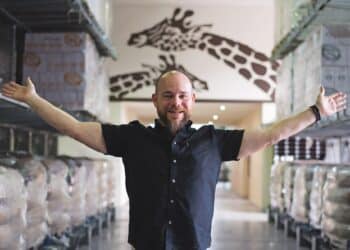Achieving longevity in any market can be challenge, but Cofi-Com’s secret to 31 successful years as an importer of quality coffee comes down to three core values: delivering competitively priced coffee, quality beans, and personal service.
This was the philosophy of Andrew Mackay and his business partner when they founded Cofi-Com in 1987, and it remains a large part of why the company has such long-standing relationships with roasters throughout Australia, Europe, New Zealand, and Asia.
Cofi-Com started out of a warehouse in Seven Hills and gradually grew to accommodate a head office and coffee lab in Sydney. In 2003, Volcafe acquired Cofi-Com, the coffee trading arm of agricultural commodity merchant ED&F Man.
“Cofi-Com has the best of both worlds. We’re able to tap into Volcafe’s global network as well being able to source specialty coffee directly from small producers and growers,” says Cofi-Com’s John Russell Storey. “We can source anywhere from one or two bags for small roasters to large containers. We deal directly with our own staff at origin, so their knowledge of the area and deep roots in the local coffee industries is vast, from growing to shipping. It’s a very flexible system.”
In many of the countries Cofi-Com sources from, John says Volcafe doesn’t “just buy coffee”, it employs agronomists and quality trainers to give producers advice on such things as crop financing and sustainability practices, including how to identify quality coffee, how to use coffee byproduct as fertiliser, and the benefits of planting shade-grown trees.
“Working with the right people is crucial. If a producer goes down the specialty route, it’s a long-term relationship with the farmer,” John says. “Initially you might drop 15 to 20 per cent of your harvest, but it’s an investment. One of the farmers we’re working with in Papua New Guinea is currently moving from washed to honey processing. It’s not an overnight process and will take three or four seasons to get right, but growers are fighting a crowded market too and they have to find their own point of different so they can support their families.”
Cofi-Com is known for its range of green coffees, but for almost a decade it has been quietly building up a range of top end specialty coffees. Cofi-Com’s Andrew and Dariusz Lewandowski have drawn on their extensive personal networks to source a portfolio of specialty coffees and microlots that range from the highly prized Indonesian Blue Bianca to Yemen Harazi.
“The business sees an ongoing demand for high grade, realistically priced specialty coffees that taste great,” John says. “We see this sector of the market maturing and roasters questioning the viability of extortionately priced beans. Too often we taste coffees in the $18 per kilogram upwards bracket that don’t cup as well as an $8 kilogram bean from the same origin. Expensive coffees are nice to have and we can bring them in, but we stock the coffees people want to buy.”
Two factors that Cofi-Com has practiced for some decades through its direct relationships is sustainability and traceability. John says both remain a core focus of the company, on site and at origin.
“There’s so much information out there, yet some farmers still don’t have internet access. We take a soft approach to help them transition. Our sister companies produce pamphlets in local dialects, and hold small workshops to educate farmers on things such as weed control, pruning and sustainability – something I saw for myself in PNG,” John says. “Once the farmers are trained, they can train others.”
As a business, Cofi-Com intentionally maintains a relatively low market profile, concentrating on its own customer base and working with roasters to support their green bean requirements.
As a result, its sourcing, grades and qualities are all customer driven, meaning beans move through its logistics chain quickly and are replenished by continuous container arrivals from origin each month.
John says coffees from Brazil, Colombia, and Ethiopia remain the “rock” of a lot of blends, but sees promising results from neighbouring countries including PNG, Indonesia, and Myanmar.
“I expect to see big things from these origins in 2018, and also Australia. Look closer ashore to producing areas such as far north Queensland and Byron Bay, and you’ll find origin is real and alive on our own doorstep,” John says.
“We support it and we encourage anyone to try Australian-grown coffee when they see it. That’s what Cofi-Com is all about – sourcing great coffee anywhere in the world, be it in our own backyard or in the remote areas of the world, always with personal service and many years of experience.”
Cofi-Com Head Office:
73 Ryedale Road, West Ryde, NSW 2114
+61 2 9809 6266
Coffee Lab/Speciality Team
34 Huntingwood Drive, Huntingwood, NSW 2148
+61 2 9838 0858




